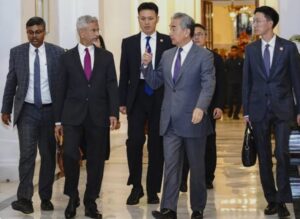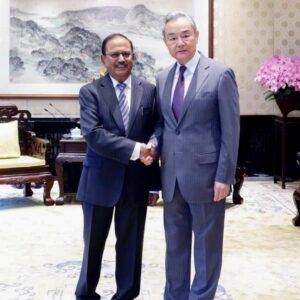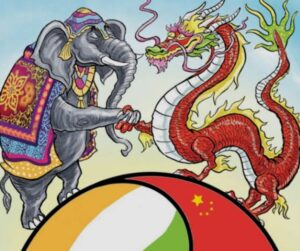Chinese Foreign Minister Wang Yi’s Visit to India: A Strategic Reset or Tactical Pause?
Chinese Foreign Minister Wang Yi’s Visit to India : Wang Yi is on a two-day official visit to India, marking his first trip to New Delhi in three years.
From border peace talks with External Affairs Minister S. Jaishankar to strategic discussions with NSA Ajit Doval and a meeting with Prime Minister Narendra Modi, the visit comes at a crucial time.
With Modi may to travel to China for the SCO Summit 2025, Wang Yi’s Delhi stopover is seen as an effort to stabilize India-China ties, ease tensions along the LAC, and revive cooperation in trade, connectivity, and pilgrimages.

Key Meetings and Engagements During Wang Yi’s Visit to India
1. Talks with Indian Foreign Minister S. Jaishankar
External Affairs Minister S. Jaishankar and Wang Yi discussed a wide range of issues—border peace, economic ties, trade, pilgrimages, river data sharing, and connectivity.
Jaishankar emphasis the need for “candid and constructive dialogue” and stressed that relations should be guided by the “three mutuals—mutual respect, mutual sensitivity, and mutual interest.”
2. Special Representatives’ Dialogue
Wang Yi is also holding the 24th round of Special Representatives’ talks on the boundary question with India’s National Security Advisor Ajit Doval.
This discussions are expected to cover troop disengagement, resumption of flights suspended since 2020, and possible confidence-building measures.
3. Meeting with PM Narendra Modi
On the final leg of his visit, Wang Yi will meet Prime Minister Narendra Modi.
The conversation is expected to focus on restoring peace at the border and preparing ground for Modi’s upcoming trip to China for the Shanghai Cooperation Organisation (SCO) Summit in Tianjin on August 31 – September 1.
Context of the Wang Yi’s Visit to India
75 Years of Diplomatic Relations : This year marks the 75th anniversary of India-China diplomatic ties. Both countries are using this milestone to explore ways of reducing hostility and promoting cooperation.
A Thaw After Years of Tension
For much of the past four years, relations were frozen:
Border clashes and troop build-ups along the LAC.
Suspension of flights and tourist visas.
Investment restrictions and Chinese apps banned in India.
Limited people-to-people contact.
Despite multiple rounds of border talks, no major breakthrough had been achieved until recently.
Wang Yi’s Visit to India : Why the Shift Now ?
Interestingly, analysts point to an unexpected catalyst—Donald Trump’s tariff policies.
The US President’s aggressive trade measures against both India and China created a shared grievance, nudging the two Asian powers closer.
Rather than isolating Beijing and disciplining New Delhi, Washington’s pressure ended up encouraging limited cooperation between them.

Signs of Re-Engagement during Wang Yi’s Visit to India
Several small but significant steps taken to ease tensions:
Direct flights between Delhi and Beijing are set to resume after five years.
Tourist visas for Chinese nationals now restarted, with Beijing reciprocating for Indians.
China has eased restrictions on urea exports, a key relief for India’s farm sector.
The Kailash-Mansarovar Yatra, suspended since 2020, is resuming for Indian pilgrims.
Together, these gestures signal a willingness to stabilize ties, even if deep distrust remains.
What Experts Say: Reset or Pause?
While Wang Yi’s visit signals progress, experts caution against seeing it as a complete reset. Several realities remain unchanged:
China’s close ties with Pakistan continue to trouble india.
Troops remain deployed along sensitive border points.
Strategic rivalry in the Indo-Pacific remains a fact. This is less a reconciliation and more a “tactical pause”, where both sides seek calm borders and steady trade while hedging against long-term conflict.
Looking Ahead: Modi’s China Visit
Prime Minister Modi’s trip to China for the SCO Summit will be crucial. If Wang Yi’s Delhi visit is about laying the tracks, Modi’s visit may decide whether the two nations actually move forward together.

Conclusion: Interests, Not Emotions, Drive Diplomacy
Geopolitics has no permanent friends or enemies, only permanent interests.
Today, India and China share three:
- Stable trade flows
- Peaceful borders
- Strategic space from Washington’s pressure
Whether this fragile truce endures remains uncertain. But for now, the dragon and the elephant have found a reason to march in step—if only cautiously.
Read Also: CP Radhakrishnan Will be New Vice President of India ? Why BJP chose him ?
